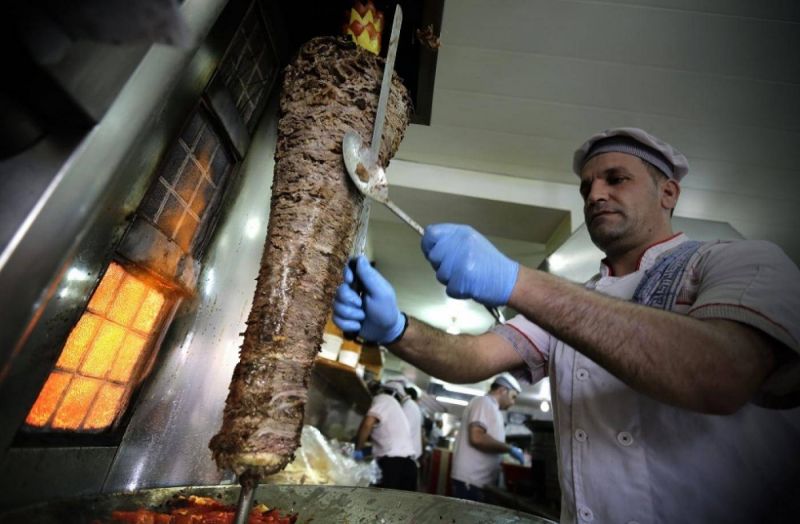
A cook preparing shawarma in a Lebanese restaurant. (Credit: AFP illustration photo)
On social media, the number of people suffering from food poisoning in Lebanon — where electricity cutoffs often mean poor refrigeration — seems to have risen in recent weeks.
While the restaurants, bars and seaside resorts in the crisis-hit country are full this summer, are cases of food poisoning really on the rise?
With the aim of separating fact from fiction, L’Orient-Le Jour spoke to experts and restaurateurs owners, as well as a number of victims of food poisoning.
“To say that it is a food poisoning case, it is essential for vomiting and diarrhea to occur simultaneously shortly after eating the food, followed rapidly by a fever,” said Dr. Nicolas Kouyoumji, a pediatrician.
“In a foodborne infection case, the patient is likely to be hospitalized for at least 24 hours,” he added.
‘I’m traumatized’
“I ordered a hamburger from a well-known American fast-food chain. My meal had raw vegetables. I’d barely finished my lunch when I felt ill,” said Sara*, in her 30s.
“Stomach pains, nausea, vomiting … I couldn’t take it anymore,” she said.
“I took an initial cure of antibiotics, but it didn’t work. I had to take two more antibiotics and finally recovered 30 days later,” she said. “I no longer order any meal with raw vegetables. I’m traumatized.”
Elie, an office manager, also seems to have had his fill of raw vegetables.
“I ordered a zaatar and labneh manousheh from a bakery in Beirut, served with raw vegetables,” he said.
“For lunch, I ordered a dish of mouloukhieh with a colleague at the office. In the afternoon, I started to feel sick. My colleague was fine, which confirms that the problem came from the vegetables I’d eaten at breakfast,” said Elie. “Diarrhea, vomiting and fever. I was treated for three days and now I feel much better, although the fever hasn’t completely gone.”
On social media, several testimonials coupled with videos or photos — which are not always verified — show products unfit for consumption.
In May, a video posted by a dissatisfied customer of a major pastry chain showed a chocolate cake full of mold when it was cut. The chain acknowledged the error and said it was investigating.
‘The situation is not alarming’
Dr. Kouyoumji said the rate of food poisoning in 2023 is no higher than in previous years.
According to Dr. Georges Khalil, a specialist in internal medicine and infectious diseases, the risks of food poisoning are present everywhere. “But in Lebanon, the economic crisis and power cuts are exposing the population to an increased risk,” he added.
“Power cuts combined with the summer heat can lead to the consumption of products that look normal but that got affected by bacteria growth ... But the situation is not alarming,” he said.
To make up for the endless power cuts, Raymond Yaghi, manager of the Red Deer restaurant in Baabda, explained that he uses private generators to preserve the freshness of the food served.
“At the end of the day, the leftovers are distributed to the staff and nothing is kept for the next day,” he said.
But for small restaurants, health standards sometimes seem harder to comply with.
“Since my husband and I expanded our menu and attracted more customers, I’ve been overwhelmed,” says Zeinab Seblani, owner of a snack bar in Beirut’s Gemmayzeh neighborhood. To avoid having to compromise on cleanliness, she has had to take on extra employees.
L’Orient-Le Jour tried to contact Tarek Younes, director of the consumer protection department at the Economy Ministry, and the caretaker Health Minister Firas Abiad.
Both were unavailable for comment.
*The first name of the interviewee has been changed at their request.
This article was originally published in French in L'Orient-Le Jour. Translation by Joelle El Khoury.